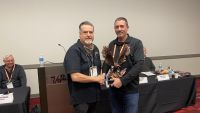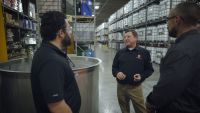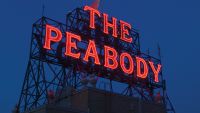Contractor to Contractor: Davenport Masonry, Inc.
By Masonry
Ed Davenport - Davenport Masonry, Inc., Holt, MI
On May 20th, Ed Davenport, Owner of Davenport Masonry, Inc., was recognized at the Tri-Centennial State Park and Harbor Dedication ceremony for creating a beacon of light, both figuratively and literally. Davenport Masonry has created not only the first masonry lighthouse on the Detroit River, but also the centerpiece of the City of Detroit's $500 million riverfront renovation project, set to be completed by 2006. According to Mike Piazza, Foreman of Davenport Masonry, "It is the simplest and trickiest building I've ever built." The lighthouse is a pure loadbearing masonry structure that has a base circumference of 16 feet that tapers to eight feet at the top ? no frames, anchors, ties, bolts, wire, flashing, weeps, grout or level reference points to work with. Not only did the five-degree vertical slope prove an interesting task ? bricklayers had to tape a wooden wedge to their levels to get the proper angle ? but try installing a rectangular door in a round building! Davenport spoke to us the day before the dedication ceremony about this monumental project, being a mason contractor and the industry in general.
Masonry: How does it feel to have created the focal point of Detroit's $500 million Riverfront renovation project?
Davenport: It's flattering to have been a part of it.
Masonry: You don't build a mock lighthouse every day. Tell us how this project varied from traditional rectangular buildings that your crews are used to building.
Davenport: It was certainly a neat challenge. There was no block involved ? it was all brick. It was circular and battered back, with the wall diameter varying from top to bottom. It was certainly a scaffolding and a site logistics challenge, and quite different from the typical job.
Masonry: DMI utilizes a web site and a marketing team. How has this been an asset to your company?
Davenport: It gives you exposure, and it raises your level of credibility.
We associate with the Masonry Institute of Michigan, IMI, Mason Contractors Association of America, Michigan Mason Contractors Association, and the MCA, which is the Detroit union mason contractors. All of these groups have funding and, to some degree, have marketing responsibility.
I'm never ever satisfied, which is probably just me. So I decided that if I'm never ever satisfied, then maybe we need to take a run on marketing. Maybe we need to make that a part of our own company. So I'm not trying to take away from any of those other groups, but to see if we make it a part of our operation, if I could end up being more satisfied.
Masonry: Davenport's web site states that the company is "innovative and creative, using new processes such as access/egress, lightweight block, tower scaffolding, scaffold steps and more." Why do you think this is important to point out?
Davenport: I think it's important to try to lead by example. I would assume it's more fun to work for a company that tries some things that are maybe outside the box. Masonry has a reputation of being rather stoic and backward. I think it's important that our customers see that we are trying to be more innovative and trying to do some things that are different in an effort to improve our company and our industry.
Masonry: What types of ongoing training do you offer your staff?
Davenport: We have done a lot of total quality management training that is very customer-focused, which I think is an aspect lacking in our industry. I think way too many contractors, either themselves or their employees, don't focus on the value of the customer. We do lots of different types of training to try to bring our people along. They are trying to get our people to understand our systems better.
Masonry: One of the responsibilities of your Safety and Manpower Director is to track laborers. How does this work, and is it effective when you have a labor crunch?
Davenport: He tracks all workers, and it's an ongoing list, not just laborers.
By creating a list of workers, we're better known. When someone calls looking for work, it means something if they actually know that someone has recorded the data of their call, where they're from, where they want to work, what they want to do. So then you have a lot bigger base to pull from.
We also work heavily with the local union, but they know how we operate as well. We seem to do OK going to what we refer to as a remote site and being able to round up a respectable crew and go to work.
Masonry: Davenport Masonry recently took part in the Perry middle and high school's annual Career Day. Why do you think it's important to participate in events such as this?
Davenport: I think our industry needs the exposure. This is not a bad way to make a living, and I think a lot of people don't know it. So I think that the youth and educational professionals need to know about our industry. Perry is just a school system, but you have to start somewhere.
Masonry: Davenport offers a very interesting warranty. If the design team allows your company to review the blueprints and accepts your suggestions regarding flashing, masonry interfaces, water issues and overall integrity, you will extend warranty protection. How has this cooperative approach worked out for you?
Davenport: Fairly well. We believe that when we're given the opportunity to review the document and if we see issues that need to be addressed and they are addressed ? I mean, it's a long-term product that we build. Really, if it's designed correctly and you build it correctly, the warranty is not much of an issue.
Masonry: What do you feel is the biggest misconception about the masonry industry?
Davenport: That it's a dying industry.
Masonry: What would you do to change that misconception?
Davenport: I think it needs to be done through marketing, it needs to be done through innovative approaches. We need to recruit, train and retain the best workers. If you do that, your productivity is going to go up, your level of workmanship is going to go up, and you will be a sought-after building system.
Masonry: What are your biggest concerns in keeping your company successful?
Davenport: Continuous improvement. Getting the entire work force ? management team and all workers ? to understand that it is absolutely mandatory that we as an industry have productivity improvement.
Also, I believe if your entire team focuses on the customer, you should be successful. It's a concern keeping everyone focused on the customers' needs.
Masonry: What do you feel is the industry's biggest challenge in the near future?
Davenport: All the same things that I just said. I think mason contractors as a whole don't focus on the customer enough, and I don't think that as an industry ? and I'm talking from stem to stern ? we are focused enough on productivity improvement. The unfortunate thing when you say "productivity improvement" is that all most people can hear is someone screaming at them to bend over and work harder. Really what we are asking them to do at a worker level is to work smarter, and from an association standpoint, to work to promote good, practical design.
Masonry: Where do you think the masonry industry is going to be 10 years from now?
Davenport: I want to believe that we are going to be increasing market share, which means that we should be perhaps stronger than ever.
Masonry: What do you think will be the masonry industry's biggest competitor in 10 years?
Davenport: Well, the precasters sure seem to be doing a heck of a job. If I were a betting man, I'd probably bet on the precasters. They seem to have a really focused marketing effort, and they seem to do a pretty darn good job of controlling their costs.
Masonry: What do you feel are the most critical issues you'll face with future government regulations?
Davenport: Probably ergonomics and silicosis. It's all relevant to how they shake out.
Masonry: Which group do you feel has the bigger impact on masonry's future: architects, engineers or general contractors?
Davenport: It should be architects, but as we speak, I'm going to tell you general contractors. Really, it's construction managers. They seem to be perhaps the most influential segment of our industry right now.
Masonry: What do you like most about being a member of MCAA?
Davenport: I'm pretty excited about this new web-based marketing campaign (MasonrySystems.org) they have where they are sort of acting as a clearinghouse for the nation to give out good ideas. I think that is a huge step in the right direction. You need a national presence. Local presence and state presence are great, but we need a more global presence.
About the Author
Masonry, the official publication of the Mason Contractors Association of America, covers every aspect of the mason contractor profession - equipment and techniques, building codes and standards, business planning, promoting your business, legal issues and more. Read or subscribe to Masonry magazine at www.masonrymagazine.com.


















